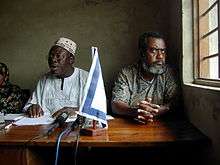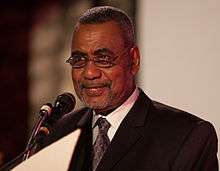Seif Sharif Hamad
| Maalim Seif Sharif Hamad | |
|---|---|
 | |
| First Vice President of Zanzibar | |
|
Assumed office 9 November 2010 | |
| President | Ali Mohamed Shein |
| 2nd Chief Minister of Zanzibar | |
|
In office 6 February 1984 – 22 January 1988 | |
| President |
Ali Hassan Mwinyi Idris Abdul Wakil |
| Preceded by | Ramadani Baki |
| Succeeded by | Omar Ali Juma |
| Personal details | |
| Born |
Seif Sharif Hamad 22 October 1943 Pemba, zanzibar |
| Nationality | Tanzanian |
| Political party | CUF |
| Other political affiliations | CCM (1977–1988) |
| Residence | Zanzibar |
| Alma mater | UDSM (BA (Hons)) |
Seif Sharif Hamad (born 22 October 1943) is a Zanzibari politician. He is the secretary-general of the opposition Civic United Front (CUF) party and first vice president of Zanzibar.
Early life and career


1950–1957: Hamad attended Primary School at Uondwe and Wete Boys School, in Pemba. He started his secondary education from 1958–1961, at King George VI Memorial Secondary School, in Zanzibar Town, Zanzibar. Hamad goes on to attend High school education at the same school from 1962–1963.
After completing high school in December 1963, for the next nine years (1964–1972), he was prevented from pursuing University Education because he was required to fill in one of the vacancies in the civil service caused by the mass departure of British officials in 1964,[1] after being asked to do so by the new Zanzibar Revolutionary Government. He was posted to teach in Secondary Schools, before joining University of Dar es Salaam in 1972–1975, and graduated with B.A. (Honors) in Political Science, Public Administration and International Relations.
Political career
Hamad served as Member of the Zanzibar Revolutionary Council and Zanzibar Minister of Education (1977–1980), founding member of the Zanzibar House of Representatives (1980–1989) and Member of Tanzanian Parliament (1977), Member of the Central Committee and National Executive Committee of Chama cha Mapinduzi (CCM) - Tanzaniania's Ruling Party (1977–1987), Head of the Economic and Planning Department of the CCM (1982–1987) and Chief Minister of Zanzibar from 6 February 1984 to 22 January 1988.[2] Soon after his dismissal, he was expelled from the sole legal party, Chama Cha Mapinduzi (CCM), after disputes with party officials. From May 1989 - November, 1991 he was imprisoned as a prisoner of conscience.[3]
When Tanzania adopted a multiparty political system in 1992, Hamad along with other former CCM members founded the Civic United Front party. The first multiparty elections took place in 1995 and Hamad was the CUF's candidate for the Presidency of Zanzibar. He was narrowly defeated by CCM candidate Salmin Amour, winning 49.76% of the vote to Amour's 50.24%. Observers noted serious irregularities in the poll and the CUF rejected the result as rigged.
Hamad was again defeated in the 2000 elections by CCM candidate Amani Abeid Karume. He received 32.96% of the vote to Karume's 67.04%. Observers condemned the poll citing widespread irregularities and instances of intimidation of opposition supporters by the security forces. The Commonwealth of Nations team described the election as a 'shambles'.
On 26 and 27 January 2001, more than forty five CUF supporters were gunned down by Tanzanian Security Forces in peaceful demonstration called to protest the imposition of Zanzibar Government against the will of the people. This led to the ruling CCM party and opposition CUF to have a dialogue that resulted in signing MUAFAKA II, a peace accord designed to ensure electoral and constitutional reforms. Most of the planned reforms were not implemented by the government, including, crucially, an agreed credible voter's register prior to the elections of October 2005.
In the 30 October 2005 election, according to official results, Hamad was again defeated by Amani Abeid Karume, winning 46.07% of the vote to Karume's 53.18%. CUF disputed the election and refused to recognise Karume as President. International observers, such as the Commonwealth, and National Democratic Institute again noted serious concerns with the fairness of the poll, and the United States boycotted the swearing-in ceremony of Abeid Karume as President.
The union elections in December 2005 followed a similar pattern on Zanzibar with CUF carrying Pemba but not Unguja. On 31 October 2010, Tanzanians vote to elect President of Tanzania and Zanzibar and Hamad runs for election,alongside Dr Ali Mohamed Shein of the ruling party CCM who was declared the winner on Monday, 1 November 2010, scooping 179,809 votes against 175,338 votes of Hamad. Dr Shein's victory is equal to 50.1 per cent of all the 364,924 votes cast while Hamad garnered 49.1 per cent.[4] In October 2015 Hamad won the election by 25000 votes against Incumbent Ali Mohamed Sheni but the election commission canceled the election after noticing ruling party had lost the election. In March 2016, Hamad refused to participate in the rerun of the election which brought Dr Sheni to power again illegally .
Political victimisation
In January 1988, he was unceremoniously dropped from the Revolutionary Council and removed as the Chief Minister of Zanzibar and in May 1988 he was expelled from the ruling CCM with six colleagues and automatically lost his parliamentary seat in the Zanzibar House of Representatives.[5] In May 1989, he was arrested and taken to court to face (politically motivated) trumped up charges of allegedly being found with government secret documents. From 1989–1991 he was remanded in the Zanzibar Central Prison. In April 2000, he was arrested and charged with trumped up charges of allegedly attacking members of the police and robbing them with a gun. (The charges were finally dropped by the Zanzibar Magistrate’s Court in November 2003).[6] Hamadi became the first ever vice president of Zanzibar when Dr. Shein was sworn in as president of Zanzibar.cuf isles
References
- ↑ "Archived copy". Archived from the original on 2010-10-23. Retrieved 2010-11-02.
- ↑ "Political Leaders:Tanzania".
- ↑ "Tanzania: Fear of Arrest of Prisoners of Conscience / Possible death Penalty". Archived from the original on 2012-09-30.
- ↑ Mushi, Deogratias (2010-11-02). "Tanzania: Isles Picks Shein for President". Tanzania Daily News (Dar es Salaam). Retrieved 2017-11-21.
- ↑ "Tanzania: Fear of Arrest of Prisoners of Conscience / Possible death Penalty" (PDF).
- ↑ "Archived copy". Archived from the original on 2010-10-23. Retrieved 2010-11-02. (Link inactive, 2016)